Nigeria’s digital sector to create 3 million jobs by 2027, says Jobberman
Here are three key insights from the Jobberman's digital sector skills gap report.

Unemployment is one of the many ills that plague the Nigerian labor market, as the country only captures 49% of its human capital potential.
According to our previous post, Nigeria's labor market is saturated with millions of jobseekers but very few jobs. Recent data from the National Bureau of Statistics suggests that the country’s unemployment rate currently stands at 33.3%.
Jobberman’s report dubbed “Digital Sector: Skills Gap Report” indicates that Nigeria’s digital economy holds the potential to create jobs and reduce the rate of unemployment. However, to fully harness the sector's potential, there is a need for the country to invest in digital and soft skills.
Here are the takeaways from the report:
5 key trends are shaping the growth of the digital sector
The global economy is undergoing rapid digital transformation, and Nigeria is said to be in the best position to reap the benefits of the digital economy.
The country’s potential is evident in its size as the biggest digital market and the leading destination for investment in Africa. Experts estimate that Nigeria’s digital sector could add $88 billion and 3 million jobs to the economy by 2027.
Five key trends drive the growing potential of Nigeria’s digital sector. They are:
- Urbanization and increasing youth population: Nigeria is at the edge of an urban revolution with a population of over 200 million and a youth population estimated at over 100 million (between ages 15-35 years).
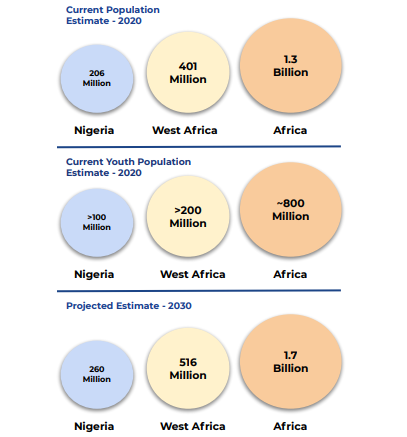
Young people are migrating to the urban areas in close proximity with new technologies, improved opportunities, and self-employment. This migration is boosting consumer expenditure. According to a McKinsey report, the spending patterns of consumer goods and services in African cities is 79% higher than the national average.
Jobberman suggests that this migration rate will boost local consumption and also increase competitiveness in skilled and unskilled labor.
- Increasing mobile penetration: Nigeria is the largest mobile market in Africa. At a 61% penetration rate, the country’s internet subscribers stood at 126 million in 2020.
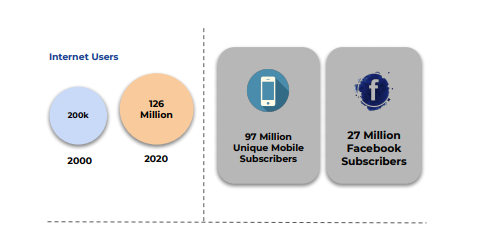
e-Conomy Africa predicts that increasing Africa’s internet penetration by 10% can increase its GDP per capita by 2.5%. Also, increasing the continent's internet access to 75% can create 44 million jobs. This growth will ride on the rising smartphone penetration, payment services, and e-commerce market.
- COVID-19:Despite the impacts of the Covid-19 pandemic in 2020, the Nigerian ICT sector made a reasonable contribution to the GDP. Jobberman reveals that ICT's contribution rose from 12.46% in Q2 2015 to 17.83% in Q2 2020.
The recent growth trend is associated with an increasing need for businesses to sustain remote work and skeletal operations. Jobberman also reports that the trend will favor sub-sectors like; fintech, e-commerce, and healthtech.
On fintech, the trend will drive cashless transactions and e-payment solutions. On e-commerce, it will boost online shopping and enhance telemedicine for healthtech.
- Fourth Industrial Revolution: Technology advancement across businesses, governance, and social interaction is influencing business operations and the ICT sector in general.
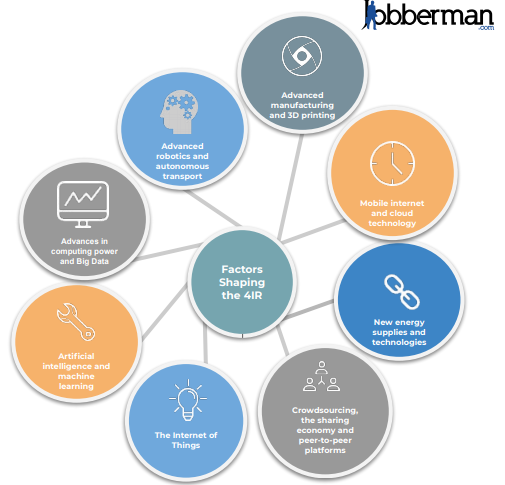
Developments in artificial intelligence, machine learning, peer to peer platforms and manufacturing technology is helping companies and individuals access new opportunities for productivity.
According to the World Economic Forum 46% of work activities in Nigeria will be susceptible to automation.
- Improved business environment: The Nigerian government has initiated reforms to improve the ease of doing business in the country. These initiatives helped the country move up 15 places from its former position of 146 in the 2020 Ease of Doing business index report.
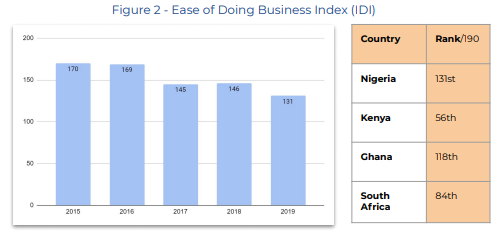
The government also set a target to achieve 95% digital literacy in Nigeria by 2030. The policy aims to equip young people with the necessary skills required to get decent jobs while transforming Nigeria into a leading digital economy.
Nigeria's labor market is under prepared for the digital disruption
Nigeria’s labor market is overwhelmed with high unemployment and underemployment rate. According to the National Bureau of Statistics (NBS), 1 in 4% of Nigerians are unemployed, while 1 out of 3 Nigerian youth (15-35 years) are unemployed. Generally, Nigeria’s unemployment rate is 55.7%, while the youth unemployment rate is 63.1%.
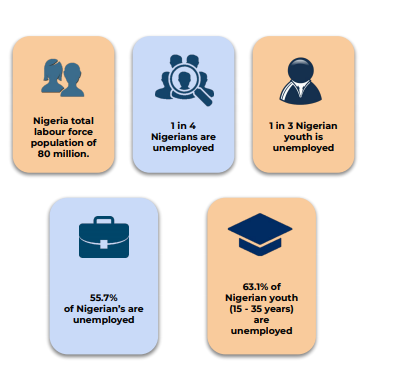
The low creation of jobs is responsible for the unemployment menace in Nigeria. The number of jobseekers does not compliment the number of jobs available. In 2018, only 450,000 new jobs were created, whereas over 5 million people joined Nigeria’s labor force.
According to the World Economic Forum, the Fourth Industrial Revolution could lead to 75 million job losses by 2025. But, it could also create 133 million jobs, thus leaving a balance of 58 million jobs.
However, certain indicators suggest that Nigeria is underprepared for the Fourth Industrial Revolution's disruption to jobs and skills. Some of these indicators include;
- Gaps within the education system lead to little or no development of the technical and soft skills that job seekers require to attain employability. The quality of Nigeria’s education is low. 13 million children in Nigeria are out of school.
- Limited opportunity for interaction between employers and jobseekers.
- Culture and policies that limit women and the less privileged from participating in decent work. The NBS reveals that 63% of women are most likely to be unemployed or underemployed.
- The mismatch between the skills needed in the digital sector and the skills that jobseekers possess.
Skill gaps are the major cause of unemployment
COVID-19 is expanding what it means to be employable, thereby creating a digital talent gap in the process. Jobberman research reveals that the pandemic increased the demand for skills in data analysis, digital strategy, cybersecurity, CRM email marketing, product management, and full-stack engineering.
However, job readiness amongst young people is very low. The pandemic created the opportunity for employers to expand their operations. Hence, the demand for digital skills, but young people are not upskilling to meet the demand.
Jobberman research also suggests that employers find it difficult to recruit digital talents with skills in artificial intelligence, machine learning, big data analytics, and cloud infrastructure. Employers are concerned that the skills gap will affect their business productivity and organizational culture.
Also, the report reveals that there is an increasing competence in soft skills, but that is not enough for jobseekers to attain employability. Jobberman established that employers lookout for both hard and soft skills when sourcing for employees.
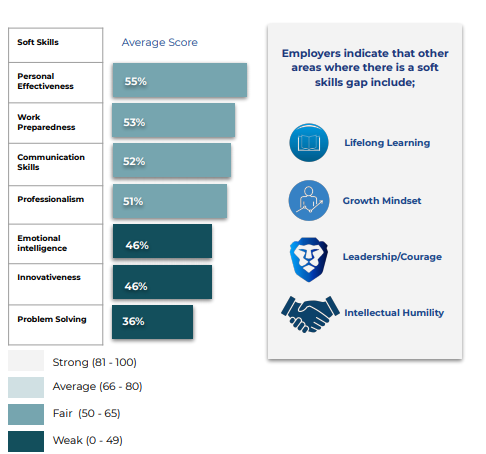
The top 10 skills gap areas mentioned by Jobberman are;
- Artificial Intelligence
- Machine Learning
- Data Science
- Identity management and access
- Big Data Analytics
- Cloud Infrastructure
- UI/UX
- Computer Programming
- Mobile Development (iOS and Android)
- Penetration Testing
Despite the increasing competence in soft skills, some youths are not conscious of what soft skills are and its relevance in the workplace. This has caused employers to shift their emphasis on certifications to practical tests as a basis for recruitment.
Read Also: Inside Jobberman’s partnership with Coursera and its plan to train 5 million Nigerians
According to a Jobberman soft skills baseline assessment, all 27,289 jobseekers surveyed scored a total average of 49%. The result is an indicator that jobseekers are generally weak at the soft skills measured.
Digital skills gap analysis
Digital Marketing
| Skills Gap | Demand Gap |
|---|---|
| Sales Skills | CRM and email marketing |
| Marketing Campaign Execution | Digital Strategy |
| Search engine optimisation |
Software Development
| Skills Gap | Demand Gap |
|---|---|
| Computer programming | Security Engineering |
| Cloud infrastructure | |
| UI/UX | |
| Web design | |
| Mobile development | |
| Design thinking |
Data Analysis
| Skills Gap | Demand Gap |
|---|---|
| Machine learning | Data Science |
| Artificial intelligence | |
| Business intelligence | |
| Design thinking | |
| Data science | |
| Big data analytics |
Network and Cybersecurity
| Skills Gap | Demand Gap |
|---|---|
| Identity management and access | Cyber security |
| Penetration testing | Security architeture |
| Cloud security | |
| Disaster recovery | |
| Server management | |
| Network processing | |
| Workstation installation |
Understanding the gap and proffering solutions
To understand the gap and proffer possible solutions that could close it, I got on a call with Femi Balogun, the Monitoring, Evaluation and Research Specialist at Jobberman. During our conversation, he mentioned that Nigeria’s education system is not in sync with the realities of its labor market.
According to him, the school curriculum and the methodology of teaching are outdated. It does not equip students with the necessary tools that the labor market requires.
“So we have graduates who are coming out of the university, but they are not engaged with digital tools. At the basic level, they struggle with tasks such as sending emails, using Microsoft tools or a computer. This rivals the current world of work where everything is digitized, except you are going to the informal sector where there is minimal demand for things related to a computer.”
Femi also blamed the gap on poverty. He opined that it is not entirely cost-effective for some youths to acquire laptops, smartphones, and data, which are essential tools they require to grow their digital skills.
On soft skills, Femi noted that educational institutions will need to embed soft skills modules into school curriculum. He said Jobberman has soft skills resources for free online, but accessing it requires lots of data, and not all youths can afford that. However, if the skills become part of the education curriculum, they will be easily accessible to everyone in school.
To drive inclusivity and boost the number of active women in the digital sector, Femi suggests that all sections of the society come together to break the culture and policies that limit women from attaining their dreams.
Regarding the gap between jobseekers and employers, Femi said visibility is one way to bridge that gap. According to him, jobseekers do not know where to find jobs, and Jobberman is rivaling that.
“So we are trying to give visibility to job seekers and making job listings available so that employers can find the right talent,” he said.
The Nigerian digital sector is rich with potentials, but tapping them is dependent on how it deploys technology and policies that will allow innovation to thrive.






